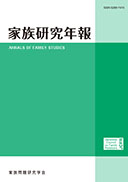Volume 40
Displaying 1-9 of 9 articles from this issue
- |<
- <
- 1
- >
- >|
SYMPOSIUM
-
2015 Volume 40 Pages 1-5
Published: 2015
Released on J-STAGE: December 11, 2015
Download PDF (176K) -
2015 Volume 40 Pages 7-23
Published: 2015
Released on J-STAGE: December 11, 2015
Download PDF (409K) -
2015 Volume 40 Pages 25-37
Published: 2015
Released on J-STAGE: December 11, 2015
Download PDF (323K)
ARTICLES
-
2015 Volume 40 Pages 39-58
Published: 2015
Released on J-STAGE: December 11, 2015
Download PDF (404K) -
2015 Volume 40 Pages 59-76
Published: 2015
Released on J-STAGE: December 11, 2015
Download PDF (344K) -
2015 Volume 40 Pages 77-91
Published: 2015
Released on J-STAGE: December 11, 2015
Download PDF (272K)
BOOK REVIEWS
-
2015 Volume 40 Pages 93-96
Published: 2015
Released on J-STAGE: December 11, 2015
Download PDF (164K) -
2015 Volume 40 Pages 97-101
Published: 2015
Released on J-STAGE: December 11, 2015
Download PDF (173K) -
2015 Volume 40 Pages 102-105
Published: 2015
Released on J-STAGE: December 11, 2015
Download PDF (151K)
- |<
- <
- 1
- >
- >|
